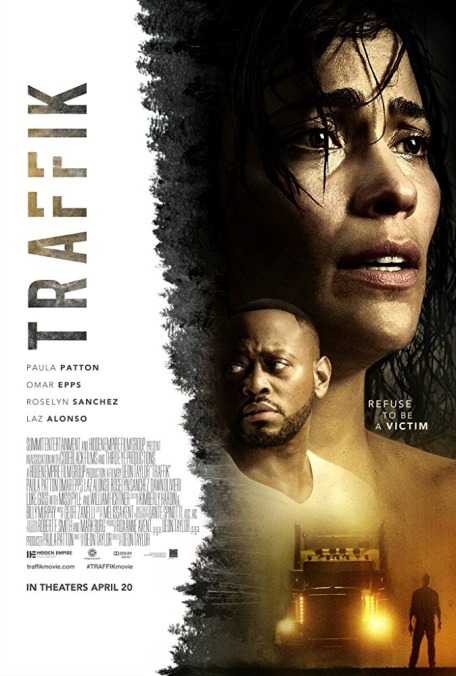Paula Patton and Omar Epps Traffik in some watchable garbage

Traffik, a watchable semi-terrible exploitation picture, has one sequence that sets it apart from the many trashy movies it haphazardly knocks off. On their way to a weekend getaway, not-quite-engaged couple Brea (Paula Patton) and John (Omar Epps) stop at a gas station. In a horror movie about mostly-white teenagers, they would be menaced or led astray by a hillbilly or two. In Traffik, the leads are put in the position of sizing up some racist bikers, an addled woman in the convenience store bathroom, and a sheriff. The sequence burns slowly and uneasily with the knowledge that any of these people could pose a threat to a black couple just passing through.
There’s no sense in spoiling which combination of villains later show up at the well-appointed guest home to perform an impromptu home invasion and retrieval of a missing phone. There’s little sense in this movie, period. The last time writer-director Deon Taylor staged a sort-of home invasion, it was allegedly comedic, in service of the bizarre Purge spoof/fanfic Meet The Blacks, and he hasn’t learned much about story mechanics since then. Rather than proceeding as a straightforward thriller, Traffik is oddly padded with scenes and details that Taylor seems to mistake for subplots, including Brea’s challenges as a working journalist, several arcs of pointless relationship drama, and the sudden introduction of a drug addiction. (The latter could be called a plot convenience if it was in any way convenient to anyone.)
But Taylor has done a better job of making his work look and feel professional, at least for a few stretches at a time. Patton and Epps deserve some of the credit here, and the many other times they’ve helped movies out simply by remaining likable performers after plenty of years in the business. They make a cute, appealing hero couple, even when they start making the obligatory terrible tactical moves in the film’s second half.
Taylor is also working with cinematographer Dante Spinotti, who may not exactly rise to Heat or Public Enemies form but at least makes a lot of low-rent action look more polished than it might have otherwise. Still, Spinotti doesn’t stop one early scene from loudly calling attention to its own artificiality, despite it consisting almost entirely of four people at a table eating dinner. Taylor cuts the conversation together with so many disorienting ill-fitting angles that the movie’s simulation of normal life looks weirder than the mayhem that follows.
Said mayhem eventually brings in a sex trafficking conspiracy—the one subplot that sticks long enough to become part of the movie’s primary mission. There’s usually something discomfiting about mainstream thrillers and action movies that feel they’re contributing something to the real-life conversation about this scourge by making it a plot device; they’re just a little too eager to fantasize about these disturbing circumstances (“based on actual events,” the movie solemnly insists with no further clarification) while giving them no greater context than a vague conspiracy that goes all the way to the top. Traffik can’t avoid this sour taste, especially given that most characters on screen, and the director just off-camera, can’t stop ogling Patton.
That’s not to say there’s anything wrong with, say, a gratuitous pool-sex scene in a trashy thriller. But chasing it with a gritty human trafficking twist is more than this movie can comfortably handle. Brea and John’s story has so many disparate elements that it’s hard to discern which questionable thematic through-line to follow: Is Traffik punishing Brea for her initial (and entirely mild) ambivalence about marriage? Or is it teaching her, in a crazy roundabout way, how to up her news-reporting game? Maybe both, maybe neither, or maybe there’s another hastily scribbled line between Brea and John’s normal lives and their eventual fate ducking through a forest at night as sex-traffickers shoot at them. Trying to figure it out makes Traffik weirdly compelling, but nowhere near good.